Related Research Articles
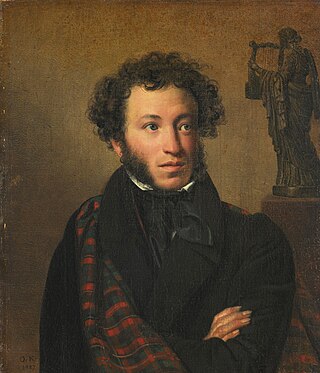
Alexander Sergeyevich Pushkin was a Russian poet, playwright, and novelist of the Romantic era. He is considered by many to be the greatest Russian poet, as well as the founder of modern Russian literature.

The Pushkin State Museum of Fine Arts is the largest museum of European art in Moscow. It is located in Volkhonka street, just opposite the Cathedral of Christ the Saviour. The International musical festival Sviatoslav Richter's December nights has been held in the Pushkin Museum since 1981.

Mikhail Yuryevich Lermontov was a Russian Romantic writer, poet and painter, sometimes called "the poet of the Caucasus", the most important Russian poet after Alexander Pushkin's death in 1837 and the greatest figure in Russian Romanticism. His influence on Russian literature is felt in modern times, through his poetry, but also his prose, which founded the tradition of the Russian psychological novel.
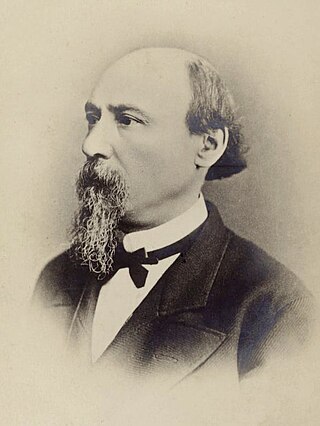
Nikolay Alexeyevich Nekrasov was a Russian poet, writer, critic and publisher, whose deeply compassionate poems about the Russian peasantry made him a hero of liberal and radical circles in the Russian intelligentsia of the mid-nineteenth century, particularly as represented by Vissarion Belinsky and Nikolay Chernyshevsky. He is credited with introducing into Russian poetry ternary meters and the technique of dramatic monologue. As the editor of several literary journals, notably Sovremennik, Nekrasov was also singularly successful and influential.

Yevgeny Abramovich Baratynsky was lauded by Alexander Pushkin as the finest Russian elegiac poet. After a long period when his reputation was on the wane, Baratynsky was rediscovered by Russian Symbolism poets as a supreme poet of thought.
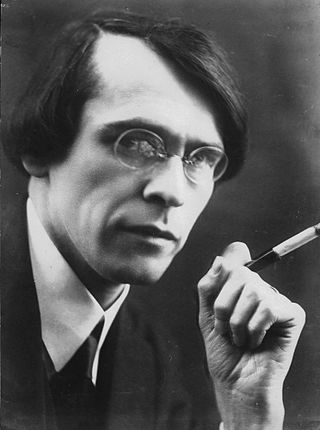
Vladislav Felitsianovich Khodasevich was an influential Russian poet and literary critic who presided over the Berlin circle of Russian emigre litterateurs.
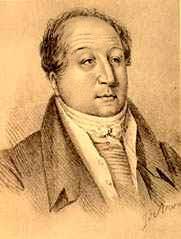
Vasily Lvovich Pushkin was a minor Russian poet best known as an uncle of the much more famous Alexander Pushkin.

Alexey Nikolayevich Verstovsky was a Russian composer, musical bureaucrat and rival of Mikhail Glinka.

Natalia Nikolayevna Pushkina-Lanskaya (Гончарова) was the wife of the Russian poet Alexander Pushkin from 1831 until his death in 1837 in a duel with Georges d'Anthès. Natalia was married to Major-General Petr Petrovich Lanskoy from 1844 until her death in 1863.

Anna Petrovna Kern was a Russian socialite and memoirist, best known as the addressee of what is probably the best known love poem in the Russian language, written by Aleksandr Pushkin in 1825.

Georgy Vasilyevich Sviridov was a Soviet and Russian composer. He is most widely known for his choral music, strongly influenced by the traditional chant of the Russian Orthodox Church, as well as his orchestral works which often celebrate elements of Russian culture.
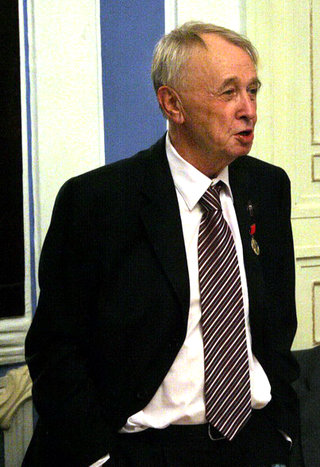
Vladimir Andreyevich Kostrov was a Soviet and Russian poet, translator and playwright. He was also a professor at the Gorky Institute of Literature in Moscow. He had been awarded the State Award of Russia (1985) and the Government Cultural Award (2006).
The Gypsies is a narrative poem in 569 lines by Alexander Pushkin, originally written in Russian in 1824 and first fully published in 1827. The last of Pushkin's four 'Southern Poems' written during his exile in the south of the Russian Empire, The Gypsies is also considered to be the most mature of these Southern poems, and has been praised for originality and its engagement with psychological and moral issues. The poem has inspired at least eighteen operas and several ballets.
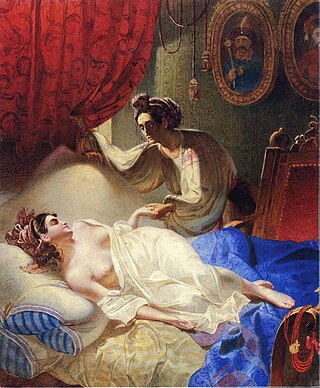
Poltava is a narrative poem written by Aleksandr Pushkin in 1828–29 about the involvement of the Ukrainian Cossack hetman Ivan Mazepa in the 1709 Battle of Poltava between Sweden and Russia. The poem intertwines a love plot between Mazepa and Maria with an account of Mazepa's betrayal of Tsar Peter I and Peter's victory in battle. Although often considered one of Pushkin's lesser works and critiqued as unabashedly imperialistic, a number of critics have praised the poem for its depth of characterization and its ability to synthesize disparate genres. The poem inspired Tchaikovsky's 1884 opera Mazeppa.

The Fountain of Bakhchisaray is a poem by Alexander Pushkin, written during the years 1821 to 1823.

Alexander Alexandrovich Ilyinsky was a Russian music teacher and composer, best known for the Lullaby (Berceuse), Op. 13, No. 7, from his orchestral suite "Noure and Anitra", and for the opera The Fountain of Bakhchisaray set to Pushkin's poem of the same name.

"Death of the Poet" is an 1837 poem by Mikhail Lermontov, written in reaction to the death of Alexander Pushkin.
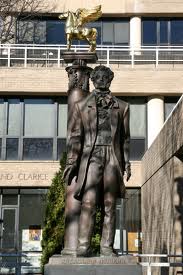
Alexander Pushkin is a bronze statue by Alexander Bourganov. It is located at the corner of 22nd Street and H Street, N.W. Washington, D.C., on the campus of George Washington University. It was erected as part of a cultural exchange between the cities of Moscow and Washington; in 2009, a statue of the American poet Walt Whitman was erected in Moscow. Pushkin's statue is said to be the first monument commemorating a Russian literary figure in the United States.

Mary Hobson (1926–2020) was a British writer, poet and translator. She wrote four novels and an autobiography. She translated Alexander Griboedov's Woe from Wit and his letters. Hobson also translated works by Alexander Pushkin. She won the Griboedov Prize and Pushkin Medal.
Alexandra Gavrilovna Snezhko-Blotskaya was a Soviet animated film director. She was a longtime collaborator with Ivan Ivanov-Vano.
References
- ↑ Thorpe, Vanessa (21 April 2018). "Pushkin descendant puts Russian poet's turbulent life on stage for first time". The Guardian .
- ↑ "On This Day: Alexander Pushkin". The Moscow Times . June 6, 2019.